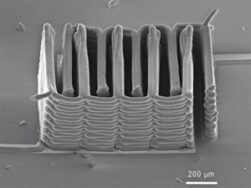A joint development effort by Harvard University, the University of Illinois at Urbana-Champaign, and visiting South Korean researchers has produced a tiny 3D printed lithium-ion battery that could be used one day as a power source for micromedical devices and robots.
This microbattery, which can fit on the head of a pin, is made by printing precisely interlaced stacks of battery electrodes – each narrower than a human hair. The research combines two current hotbeds of research activity: 3D printing, which is poised to transform manufacturing, and lithium-ion batteries, where scientists are trying to overcome charging and degradation issues.












